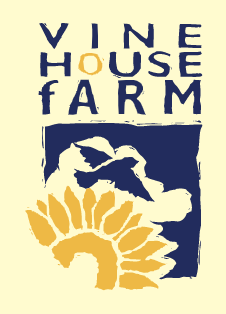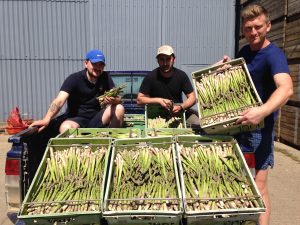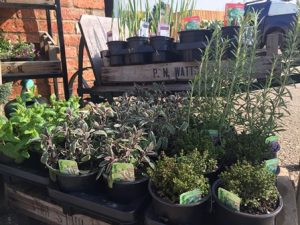
We have been lucky, I have only recorded 5.75ins or 146mm of rain in June. Some coastal areas around the Wash have recorded up to 10ins or 250mm of rain, when their yearly average is about 25ins or 630mm. Although June is not our wettest month, it is the only month I have recorded 5ins or more of rain in the last 50 years. This I have done four times and twice it has been 6ins. Temperatures, surprisingly, have been average – the daytime below average and, because of all the cloud we have had, the nights have been above average.

June was far too wet for us with potatoes being the main concern. Two of our fields have been so waterlogged that we were unable to spray them against blight for more than two weeks.
Blight is a microscopic, fungus-like organism that develops in moist weather. The spores easily break away from infected foliage and can be wind-blown for long distances during dull, humid weather. If a spore lands on a wet leaf surface, it produces many swarms that settle and grow into the tissues of the leaf. After about three days it becomes visible to the naked eye and if not treated by a fungicide it will spread through the crop. All the leaves turn brown, killing them and the crop. The spores will fall on to the ground, get washed into the soil which causes the tubers to rot away.
We spray our crops every ten days to keep blight away and if we see some of the leaves have the disease, we have to spray weekly. Over the years better chemicals have been produced to improve the control of blight, but more aggressive strains evolve and so the battle goes on.
Genetically modified potato varieties have been produced which are immune to potato blight. If we grew them, it would mean our potato crop would only need to be sprayed four times during the growing season, instead of 12. As you know genetically modified crops are not allowed to be grown in this country and until they are, these new potato varieties will have to wait to be grown commercially.
All our crops need sunshine to yield well. June let us down as far as sunshine is concerned, but as I write, the week ahead is forecast to be sunny, which should help to reduce the threat of potato blight.
Wheat crops in particular will be soaking up the sunshine until about 25°C which is too hot for the crop which often happens in the middle of England. The North Sea coasts of Yorkshire and Northumberland are where the highest yielding crops of wheat in the world can be grown, as the temperature seldom gets to more than 25°C. The days are longer during high summer than further south, allowing more sunlight to reach the crops.
The wet June has kept the men out of the fields, so they have been tidying the yard and completing workshop jobs that were on hold, such as repairing an irrigation engine and making improvements on a couple of tractors. The men have also been fixing the engine on an antique potato rocker, which riddles the potatoes as they come off the land, with one channel going for human consumption and the other to stock feed. Not something we would use in the fields these days, but a fascinating part of farming history.


Dawn chorus is now reduced to three species in our garden, Wood Pigeons, Collared Doves and the Wren. Wrens are not sociable birds and try to hold a territory all through the year, our singing Wren is telling other Wrens to keep out, but at what stage it is telling its previous partner and fledglings to keep out I don’t know. However, I don’t think it will be as brutal as that as it is in their make up to know that they will want their own territory sooner than later.
The wet weather affected all the birds on the farm and in the garden, some benefitted and for others it was disastrous, meaning the failure of a brood of young. This isn’t too bad if the species is multi-brooded, but the Black Headed Gulls are single-brooded and about 80% of their young died during the wet weather. The adults were unable to find enough food and, as they were away from the colony for so long looking for it, they were unable to brood the chicks, which got cold and died.
Blackbirds welcomed the rain as it brought worms to the surface. This means only the male was needed to collect food, whilst the female brooded the young to keep them dry and warm.
About 30% of young Tree Sparrows in our nest boxes failed during that rainy week, some due to rain getting in the nest box. We would usually recommend nest boxes face away from the midday sun, which is of course to the north, but that has back fired this year around here, as nearly all of the heavy rain was from the north east. Did you see the episode of Springwatch when Chris Packham said over 90% of Great Spotted Woodpecker nests faced north east?
Barn Owls are doing OK, I don’t know how many young were eaten during the week of heavy rain but we still have two to five broods, which is far better than last year. Last year, we had a wet April which messed up the breeding of the voles. This April was dry, so0 the voles got off to a good start, providing plenty of food for hunting Barn Owls.
The Reed Warblers had to delay their nest building, which usually happens in the second week of June. That was a wet and windy week, so they were unable to start weaving grasses around the moving reed stems. Their nests are a work of art suspended in the reeds. This year I have found about 50 of them and they are doing well.
The first Corn Buntings did not lay eggs until after the heavy rain, so they should not have been affected by the rain too much. We have been keeping feeders filled with wheat so that they have a good food source.
Several broods of Lapwings have fledged and disappeared, but our millet fields contain four pairs with young birds. The crop is only a few inches high which keeps the ground moist. This keeps the invertebrates near the surface, so the chicks have plenty of food and will be brooded by the female for longer. The male keeps watch and harasses any predator that looks like being a danger to his chicks. Predators are one reason for the Lapwings decline, but another reason is that there are less invertebrates in the majority of our soils than there used to be. This means the young chicks are constantly on the move and that movement gets noticed by the predators. By having catch crops of oil radish, this provides them with more food than on most arable fields today.
TALKS & EVENTS
We have the following Farm Walks:
3rd, 10th & 11th August: includes the sunflower fields
16th – 18th August: The Bird Fair in Rutland Waters
– we’ll be there on our usual stand, do come & see us!



